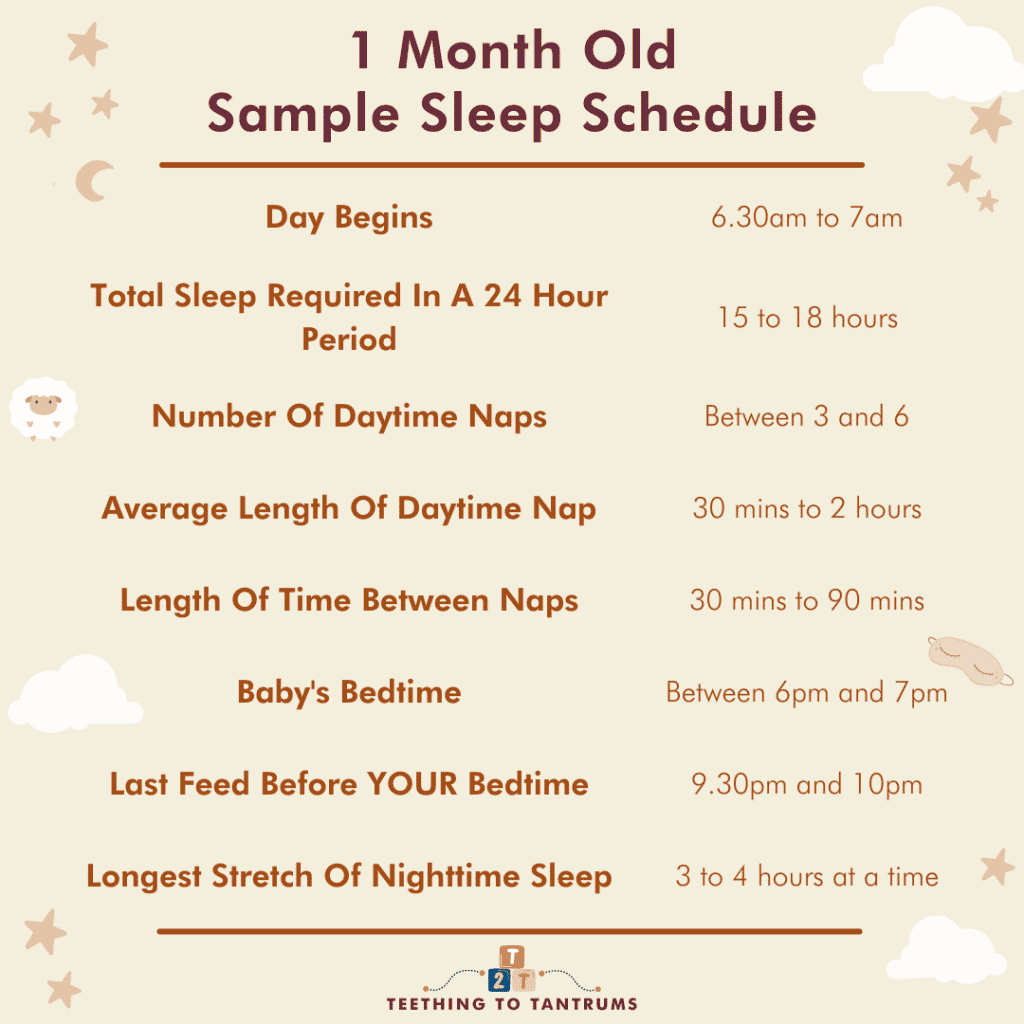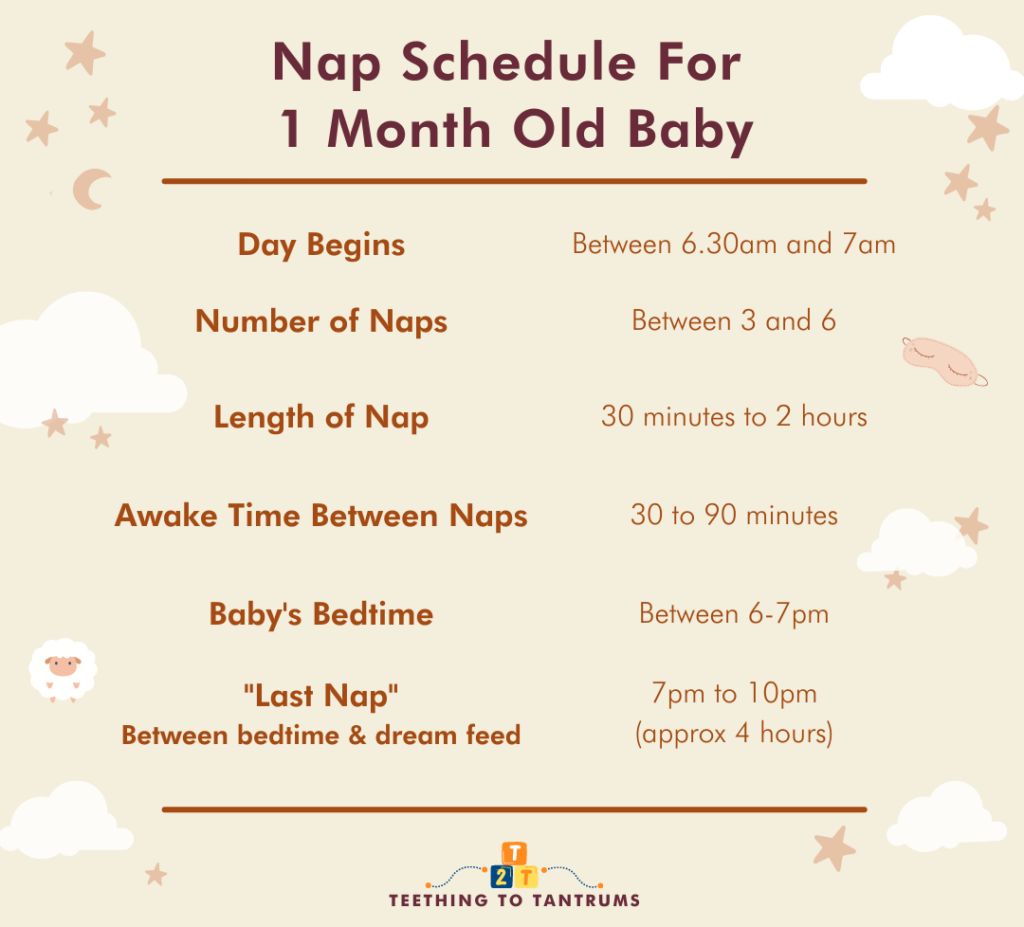Establishing a routine for newborn babies can be pretty chaotic… Especially as newborn babies won’t start to follow a consistent eat, play and sleep cycle until they are around 3-4 months old.
However, there are guidelines for wake windows and sleep patterns that can help bring a level of normality and organisation into your new life as a parent. So, here’s all you need to know about establishing a 1 month old sleep schedule…
How Much Should A 1 Month Old Sleep?
Most 1 month babies should have between 16-18 hours of sleep per day. They will be awake for 30-90 minutes before needing to sleep again and it is very normal for a 1 month old to sleep a lot during the day and not know the difference between day and night.
1 Month Old Wake Window
At 1 month, your baby will only have 30 to 90 minutes of awake time between their naps (so expect lots of daytime sleep). This ensures that your baby has enough awake time during the day to meet their developmental milestones and to consume enough daytime calories to grow at a rapid rate.
TOP TIP: If your baby is showing signs of being tired during their wake window (having only being awake for a short period of time…) then let them go to sleep again and DO NOT wait for their ‘nap time‘. Trying to keep your baby awake will only lead to them getting overtired and being unable to settle.
Sample 1 Month Old Sleep Schedule
Ok… before I give you a sample 1 month old sleep schedule, there’s an important note I must mention first.
With 1 month babies, it is crucial that we look at their sleep requirements in a 24 hour period as a whole. This is because it is very normal for a 1 month old’s sleep pattern to vary wildly from day to day.
For that reason, the 1 month old sleep schedule below is what a 1 month old baby should be doing and having WITHIN 24 hours, not minute by minute…

REMEMBER: This newborn sleep pattern is designed to be a guideline for new parents to ensure you do not get too anxious about trying to stick to a rigid schedule.
As you get to know your little one, you will learn what they like, what time of day they are more sociable and how long they like to sleep… This in turn will help you to develop a sleep schedule to fit your own baby’s needs and personality as well as your family’s lifestyle as they grow.
Nap Schedule For A 1 Month Old Baby
A 1 month old sleep schedule and their nap schedule are essentially the same thing.
At this age, babies are primarily concentrating on growing and preparing to develop a host of physical, emotional, cognitive and social skills and as a result, they will spend more of their time asleep than awake. Therefore, your baby’s nap schedule will look something like this:

TOP TIP: Despite the lack of strict timings, you can start to help your 1 month old towards a more regular sleep routine by using the same words when you settle them and the same sequence of events before you put them down. Such as the lullaby you sing, the baby books you read, the way you say goodnight and where you change their diaper.
How Many Naps Does A 1 Month Baby Need?
Typically, a 1 month old will have between 3 and 6 naps a day. The final ‘nap’ of the day is more like a sleep window between you putting them to bed and baby waking for a feed before you go to sleep. This feed is known as a dream feed.
How Long Should A 1 Month Old Baby Nap For?
Your 1 month baby will nap anywhere between 30 minutes and 2 hours at a time depending on how busy their awake period was and what their individual sleep needs are. But, it is not unheard of for babies of this age to sleep for longer.
Bedtime For A 1 Month Old
Although I am a great advocator of establishing a bedtime routine as early as possible, at 1 month old your baby is simply too young for a full bedtime schedule.
However!
The priority right now is to establish strong sleep associations by making a stark difference in your interactions with your 1 month old baby at night and day and to keep the sequence of events leading up to bedtime the same every night.
If you are bathing your baby daily, do so at the end of the day followed by a soothing massage, swaddled up for some quiet time together in a dimly lit room, followed by a feed and then settle your baby down in their nighttime sleep space bassinet or Moses basket.
Looking to get your little one to sleep quickly and effortlessly? Check out my Bedtime and Nap Cheat Sheet and master the art of making daytime naps and bedtimes as seamless as possible.
A bedtime & nap cheat sheet so good your little one will ask you to put them to bed...
Laura Williams "This is a life saver! I'm so glad I downloaded your bedtime & nap cheat sheet. My little one actually asked me to put him to bed last night! Unbelievable! Thank you so much!"
Click Here For The FREE Cheat Sheet
What Time Should A 1 Month Old Go To Bed?
Your 1 month baby will usually be put down for bed around 10pm after their dream feed. Once they are 3-4 months old, they will be able to start to have an earlier bedtime.
TOP TIP: To help establish the beginnings of sleep associations, healthy sleep habits and a bedtime routine, make sure that your little one is staying in their nighttime sleeping space until around 6am when they wake up for the day.
1 Month Old Sleep Tips
Managing a 1 month old sleep schedule is not easy and can change from day to day. But there are some things you can do to try and keep it on track and make it more manageable:
- Spend time bonding together. The most important job you have when your new baby is born is to bond and get to know them. Spending time with your little one, focusing on what they like and don’t like and observing how they respond to the world around them will help you learn to read their subtle signals as they grow.
- Learn your baby’s sleep cues. At 1 month, your baby will be showing signs of being tired that you will be able to recognise. An overtired baby will struggle to fall asleep so getting the timing right is important. baby’s sleep cues.
- Create cosy sleep spaces. Many people regard the first month of life as the 4th trimester and it is helpful to remember this when you will be learning what your baby requires in terms of comfort and sleep. As they adjust to life outside the womb it is very important that where your baby sleeps is safe, comfortable and at the right temperature (68 – 72°F or 20 – 22°C). You can use a white noise machine or play soft music to help maintain a neutral sleep environment too.
White noise machines are a game-changer for your little one's sleep and having one that plays all night is a must. With a long-lasting battery, this compact and stylish white noise machine contains 21 non-stop relaxing noises, which will lull your little one to sleep night after night, no matter where you are!
- Avoid overstimulation during the day. Be careful not to overstimulate your baby during the day. 1 month old babies cannot concentrate or participate in activities for long periods of time and if they become overtired they will struggle to settle to sleep.
- Show your baby the difference between night and day. Everything in the womb is the same so teaching your baby the difference between day and night will help to establish a nighttime routine that allows you both to get more sleep. Remember to keep your nighttime interactions low-key and start to teach your baby that nighttime wakings are for feeding only.
- Make sleep a priority. Having age-appropriate sleep will be the key to your child’s healthy development and holding onto your sanity. It is the most important aspect of your child’s routine and everything else should be built around it. Invest in a good crib, so that your baby is safe and comfortable and you can feed them easily (especially at night).
When looking for a crib I really feel that one that can grow with your baby is best. This lovely crib easily adapts to a toddler bed, then day bed or full size making the transition from crib to bed easier and less stressful for your little one. Couple this with its Greenguild Gold certification and stylish design this is a real value for money crib.
- Put your baby to bed when they are drowsy but not asleep. I know this is hard to do as we all love cuddling our babies… However, getting your baby used to falling asleep alone is essential to their development and doing this at a young age will be easier on them and you than if you leave it until they are older and the habit becomes so much harder to break.
- Start to establish sleep associations. Even at 1 month old, you can start associating certain words and actions with getting ready for sleep. These are the words you will continue to use as they grow when talking about getting ready for a nap or bedtime.
- Try swaddling your baby. Learning to adapt to life outside the womb is a challenge and swaddling can definitely help your baby with the transition. There are a lot of swaddles on the market that come in many different styles and swaddling techniques. I personally love the Halo swaddles, but choose one that you find easy to manage and that is the right thickness for your baby depending on the time of year and indoor temperature.
With soft, plush micro-fleece, this super soft swaddle wraps newborns in just the right amount of warmth. This sleep sack swaddle suits infants from birth to potentially 3 months, offering both comfort and safe sleep practices with its arm immobilization feature.
The innovative 3-way swaddling system adapts to a baby's sleep style, a crucial feature for those restless nights. Whether it's arms in, hands-to-face, or arms out, it grows with the baby's swaddling needs!
Meanwhile, the bottom zipper makes midnight diaper changes a breeze!
- Have a bath and massage at the end of the day. Giving your baby a bath and massage at the end of the day will lay the foundations of your bedtime routine and will help to calm and soothe them as they get ready for evening and nighttime sleep.
- Get outside every day. Taking your baby outside for a walk in their pram (or your arms) will help to establish a healthy sleep routine as being exposed to natural light will stimulate and regulate your baby’s circadian rhythm and help to fix day/night confusion.
The Graco Modes Pramette Stroller offers you and your child more ways to stroll together, from baby to big kid. It is 3 strollers in 1 - Infant Car Seat Carrier, Infant Pramette, and Toddler Stroller - for a versatile stroll from infant to toddler. The toddler seat converts to an infant pramette for comfortable strolls with your baby from day one. For even more options, baby can ride parent-facing or forward-facing, thanks to a reversible stroller seat.
REMEMBER: You will find that the amount of time your baby can stay awake will vary quite dramatically from day to day. It’s very difficult to predict when your 1 month old will sleep, how deeply they will sleep or how long their naps will be until they’re a few months older.
Common 1 Month Baby Sleep Problems
The most common sleep problems in this age group are:
- Day and night confusion.
- Baby wants to be fed a lot at night.
- Waking more often as they don’t stay in deep sleep for long.
- Resisting sleeping on their back.
- Fussiness after a feed due to wind from not being burped properly.
NOTE: Day and night confusion is one of the biggest issues when trying to settle your 1 month old into a sleep schedule. So, keep nighttime interactions low-key with dim lighting and little talking to combat this. By contrast, daytime feeds can be taken where it is bright and noisier and where playtime before or after the feed is encouraged.
Frequently Asked Questions About 1 Month Old Sleep Schedule
Looking for more help with creating your baby’s 1 month old sleep schedule? Find answers to the most common questions here.
Can You Sleep Train A 1-Month-Old Baby?
In short: no, I would not recommend sleep training a baby before they are 4-6 months of age. 1 month babies should be fed and allowed to sleep as often as they wish.
Watch this video to learn how to establish healthy sleep habits for years to come (to avoid sleep training altogether)!
How Much Nighttime Sleep Is Appropriate For A 1 Month Old?
A 1 month old baby will sleep between 8-12 hours at night, but they will still wake up during that time for a couple of warm feeds.
How Long Should A 1 Month Old Stay Awake For?
The amount of time your 1 month old can stay awake will depend on the time of day and their personality. Most babies will be awake between 30 mins to 90 mins before needing to go back to sleep…
However, it is important that you learn and observe your baby’s sleep cues so that they can get them back to sleep when they need to so they don’t become overtired.
Can A 1 Month Old Baby Sleep Through The Night?
No. Your 1 month old will not yet sleep through the night. While your baby may be able to sleep for a bit longer at night, they will usually not have more than 4-6 hours of sleep between feeds.
Most 1 month babies will still be waking every 3-4 hours at night and the length of time they sleep between feeds at this age will vary from one night to the next.
Why Is My 1 Month Old Sleeping So Much?
Your 1 month old baby will typically be sleeping a lot because they are developing at an incredible rate that requires a lot of energy.
When Should I See A Doctor?
If you still feel that your 1 month old is sleeping too much; is struggling to stay away for 20 minutes between naps, or is showing any of the following signs, you should seek medical advice from your healthcare provider as soon as possible:
- They are not gaining weight
- They do not appear to be comforted by being fed
- They are producing fewer than 4 wet diapers a day
- They are quiet or unresponsive
Sleep Schedules Further Reading
Here are some more baby sleep schedules to help you get the most out of helping your little one sleep as best they can.
After all…
Sleep breeds sleep!
- Newborn Sleep Schedule
- 1 Month Old Sleep Schedule
- 2 Month Old Sleep Schedule
- 3 Month Old Sleep Schedule
- 4 Month Old Sleep Schedule
- 5 Month Old Sleep Schedule
- 6 Month Old Sleep Schedule
- 7 Month Old Sleep Schedule
- 8 Month Old Sleep Schedule
- 9 Month Old Sleep Schedule
- 10 Month Old Sleep Schedule
- 11 Month Old Sleep Schedule
- 12 Month Old Sleep Schedule
- 13 Month Old Sleep Schedule
- 14 Month Old Sleep Schedule
- 15 Month Old Sleep Schedule
- 16 Month Old Sleep Schedule
- 17 Month Old Sleep Schedule
- 18 Month Old Sleep Schedule
- 19 Month Old Sleep Schedule
- 20 Month Old Sleep Schedule
- 21 Month Old Sleep Schedule
- 22 Month Old Sleep Schedule
- 23 Month Old Sleep Schedule
- 2 Year Old Sleep Schedule
- 30 Month Old Sleep Schedule
- 3 Year Old Sleep Schedule
Need More Parenting Help?
- Download our FREE Bedtime & Nap Sleep Cheat Sheet. It’s a free, easy-to-use and proven formula designed for parents of 0-5 year olds to master the art of consistently undisturbed and restful sleep without the yelling, nagging or exhausting long-winded evenings.
- Check out our Parenting Toolbox. You’ll get access to expertly-chosen products that you can guarantee are the best for your little one and your wallet.
- Are you looking for personalized guidance to navigate the challenges of parenting? I offer 1-on-1 consultations to bring you tailored strategies and actionable advice to help support your child's growth and well-being with confidence.

A bedtime & nap cheat sheet so good your little one will ask you to put them to bed...
Laura Williams "This is a life saver! I'm so glad I downloaded your bedtime & nap cheat sheet. My little one actually asked me to put him to bed last night! Unbelievable! Thank you so much!"
Click Here For The FREE Cheat Sheet






